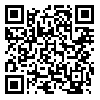Tue, Feb 24, 2026
| فارسی
Volume 23, Issue 1 (Spring 2017)
IJPCP 2017, 23(1): 108-117 |
Back to browse issues page
Download citation:
BibTeX | RIS | EndNote | Medlars | ProCite | Reference Manager | RefWorks
Send citation to:



BibTeX | RIS | EndNote | Medlars | ProCite | Reference Manager | RefWorks
Send citation to:
Pad B, Alavi K, Hajebi A. A Randomized Controlled Trial of Telephone Follow-Up in Patients With Severe Mental Illness: Study Protocol. IJPCP 2017; 23 (1) :108-117
URL: http://ijpcp.iums.ac.ir/article-1-2344-en.html
URL: http://ijpcp.iums.ac.ir/article-1-2344-en.html
1- Mental Health Research Center, School of Behavioral Sciences & Mental Health (Tehran Psychiatric Institute), Iran University of Medical Sciences, Tehran, Iran.
2- , Mental Health Research Center, School of Behavioral Sciences & Mental Health (Tehran Psychiatric Institute), Iran University of Medical Sciences
3- Research Center for Addiction & Risky Behaviors, School of Behaviors( ReCARB) Sciences & Mental Health (Tehran Psychiatric Institute), Iran University of Medical Sciences ,Email: hajebi.ahmad@gmail.com
2- , Mental Health Research Center, School of Behavioral Sciences & Mental Health (Tehran Psychiatric Institute), Iran University of Medical Sciences
3- Research Center for Addiction & Risky Behaviors, School of Behaviors( ReCARB) Sciences & Mental Health (Tehran Psychiatric Institute), Iran University of Medical Sciences ,
Abstract: (7644 Views)
Objectives This study aims to determine the effectiveness of telephone follow-up in patients with severe mental illness after discharge from hospital compared to Treatment As Usual (TAU).
Methods This is a randomized control trial with the primary hypothesis that telephone follow-up for patients with severe mental disorders in outpatient clinic would be more effective when compared to TAU in reducing the length of hospital stay and any psychiatric hospitalization. The sample population was recruited from Iran Hospital. After obtaining informed written consent, the patients were randomized into two intervention and control groups. In the intervention group, the research team closely followed the patients by telephone a day before their psychiatric follow-up visit after discharge, for timely attendance and also the day following the appointment to be ensured about their attendance. Patients were then followed up for 12 months afterward. The primary outcome measures were length of hospital stay and any hospitalization during 12 months follow-up. The secondary outcome measure was the severity of the patients’ psychopathology during the follow-up period.
Conclusion This article presents a study protocol for an RCT that assesses the effectiveness of telephone follow-up for patients with severe mental disorders in an outpatient clinical setting in Iran. The findings of this study can influence policy-making and planning for patients with severe mental disorders across the country.
Methods This is a randomized control trial with the primary hypothesis that telephone follow-up for patients with severe mental disorders in outpatient clinic would be more effective when compared to TAU in reducing the length of hospital stay and any psychiatric hospitalization. The sample population was recruited from Iran Hospital. After obtaining informed written consent, the patients were randomized into two intervention and control groups. In the intervention group, the research team closely followed the patients by telephone a day before their psychiatric follow-up visit after discharge, for timely attendance and also the day following the appointment to be ensured about their attendance. Patients were then followed up for 12 months afterward. The primary outcome measures were length of hospital stay and any hospitalization during 12 months follow-up. The secondary outcome measure was the severity of the patients’ psychopathology during the follow-up period.
Conclusion This article presents a study protocol for an RCT that assesses the effectiveness of telephone follow-up for patients with severe mental disorders in an outpatient clinical setting in Iran. The findings of this study can influence policy-making and planning for patients with severe mental disorders across the country.
Type of Study: Original Research |
Subject:
Psychiatry and Psychology
Received: 2016/08/1 | Accepted: 2017/01/12 | Published: 2017/04/1
Received: 2016/08/1 | Accepted: 2017/01/12 | Published: 2017/04/1
| Rights and permissions | |
 |
This work is licensed under a Creative Commons Attribution-NonCommercial 4.0 International License. |





